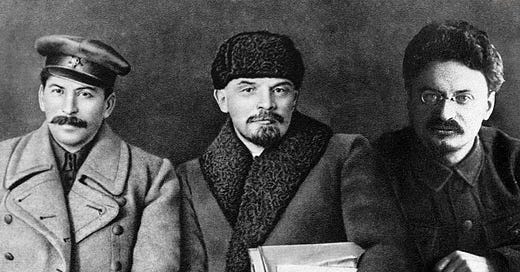The Counter-Revolutionary Nature of Professional Organizing
Reflections on professional organizing and why most of it is harmful.
"Don't you see how what you do for a living is counter-revolutionary?" my date asked as she took a nip of her beer. I awkwardly sipped the alcoholic drink I'd ordered for our lunch date, unaware and then embarrassed that the “beer” she'd ordered before mine was actually a root beer. This would have been our 3rd date and she'd never brought up my job as a professional activist. I wanted to answer the clearly rhetorical question, but I was taken aback and fumbled around in agreement until we changed the topic. But the thought never left my head.
I've been working in the nonprofit sector and in labor unions as a professional organizer for the last 8 years of my life. Organizers are activists who do the behind the scenes planning and recruitment for protests and political campaigns. I, like many young leftists, was enamored with the life of professional organizers. It was the answer to our millennial prayers. How else could I continue to throw everything I had at what I believed to be revolutionary work, while making enough money to feed myself and my roommate’s cats? It was great for a while. I wasn't making a ton of money, but talking about my occupation gave me pride: While my other friends entered the corporate world, I was doubling down on a career transforming systems and changing the world.
First and foremost, I've come to realize that the nonprofit world is deeply troubling. Much of the industry began as a means for the wealthy to avoid taxes and hoard their wealth. This hoarded wealth was and is still utilized to reshape the world in the image of the wealthy capitalists and the non-profit foundations that they control. Whether it is The Ford Foundation pushing to mass sterilize women in India, or the Bill and Melinda Gates Foundation blasting fossil fuel companies while still having $1.6 billion invested in the fossil fuel industry. The nonprofit world exists to allow wealthy families and corporations to steal wealth from the masses and use it to fund programs that otherwise should be funded by the people, with the oversight of the people. You can read the Revolution Will Not Be Funded if you want a thorough breakdown of the history of the Non-profit industry and its contradictions.
If you understand that, then you can see the dangers inherent in the nonprofit world. If we are to challenge and potentially replace capitalism, then we must ask ourselves why we let the economic elite, and those who seek to perpetuate capitalism, fund our movements. The vast majority of social change operations are funded by people who would lose out if actual systemic change was made in this country. If you believe that we need to fundamentally change our economic system, one that prioritizes the needs of the wealthy over the needs of the many and sees privatization as the only means of prosperity, then you are at odds with the end goals of those at the top of the non-profit pyramid. And if you are at odds with these people, then why would you work for them? Why would you run a campaign limited by the political allegiances of your funders, or be forced to canvas for a candidate who once referred to people who look like you as super predators? And this isn't to say you can't do any good, but you're doing good that won't actually change the system. We are band-aids for many communities, fighting to alleviate poverty, while being funded by the people who cause poverty. Raising funds for after school programs, from real-estate developers who are pushing the children who attend those programs out of their own neighborhoods. And all the while, we’re convincing ourselves and the people we organize that our organizations are genuinely the solution to their problems.
It has an impact on us too. There is nothing like the misery of being pulled from a project after having spent months building deep relationships, breaking bread, and genuinely loving the people you're working with. I feel like a traitor, a mercenary, a charlatan having sold the snake oil of revolution just long enough to meet a quota and please my bosses. A good organizer knows the importance of long term movement building, but organizers are constantly being shuffled from project to project, often across the country. It's as if the institutions we work for have different priorities than we do.
Of the $400 billion dollars going towards nonprofits a year, only 3% of it goes towards social movement work. Most of it serves to fill in the gaps of support that is expected of a modern government. It serves as a safety valve for the rich. Yes we're killing the planet, but look at all these scholarships for schools that should be free in the first place. Yes we're stealing water from indigenous communities, but we're about to get a Black Democrat elected who is going to allow us to continue to do so.
Nonprofits are not alone in sucking the energy out of good organizers and throwing them into fights that inevitably maintain the status quo. Unions have many advantages over non-profits in terms of their capacity to create change, they are often somewhat democratic and funded by everyday working people. But the reality is most unions are dominated by old conservative or liberal leadership. Not to imply that they are the same, but both liberal and conservative political leaders seek to at least somewhat maintain the same capitalist system that keeps most of the world in poverty and drags us ever closer to environmental disaster. Unions have become locked into a cycle of meager contract fights that slowly increase support for workers, while doing very little to actually change the companies, institutions, and societies their members exist within. I believe part of this is fear of reprisal from elected officials, and a lack of an inspirational vision of a future worth fighting for. But much of the inability for workers to seize meaningful power in their work place is actually limited by a deal liberal unions made in the past. The comprises of the Taft Hartley Era of labor organizing replaced radical change with compromise and led to the forced removal of radicals from the labor movement. In exchange the liberal unions could negotiate more safely on behalf of their workers, while the salaries of their leaders grew to match those of the bosses they fought against. Now most of the labor movement functions as an obedient child to the Democratic party, dutifully following its direction and fearing retribution for any potential slight against its privatize and profit politics.

We have to understand that neoliberal unions and nonprofits aren't neutral bodies. They are our opposition. And we should not build our opposition. We are in a political opening, in which our wildest dreams our possible. The reality is we only have so many hours in a week. And yes we can organize on the side, but we all know how difficult that is. Especially since organizing is the kind of work you take home with you.
Despite our often meager pay and long hours, we rarely strike or organize our own workplaces. In 2013, less than 6 percent of all non-profit workers were unionized, compared to 11.5 percent of the general public. The number is closer to 8% today but we still fall far short of the 35% unionization rates of the public sector jobs that much of our industry has replaced. And I believe part of that is a combination of the exhaustion of full time organizing work, and the reality that our strikes will undo much of the work that we are often convinced will change the world. A community organizer on strike may damage significant progress in protecting a community’s access to clean water or a grieving parent's ability to seek justice for their child. Many other industries suffer from this, but they are at least heavily unionized and have other means, though often toothless, of fighting back.
Instead of playing into their hands and serving as the foot soldiers for neoliberalism, we must escape its clutches and build anew. We have to enter industries as workers, and unions as members, and build organizations that we control. Every conversation we have with a worker is one we could be having with our coworkers, every member recruited into our community organization is a potential member of our political organization. Every lie we tell that electing this candidate will change the world is a truth we could be telling about the potentials of a radical future.
Written 2019. I think this is a little more complicated by organizations run by the left itself. The question is, are organizations like Sunrise and the U.S. Student Association meaningfully leftwing in the context of a capitalism poised to destroy humanity? And if so, how long will their funders and own tendencies allow them to be?
Also many of the links no longer work, if I get enough support for this blog, I will update all the links and data.




